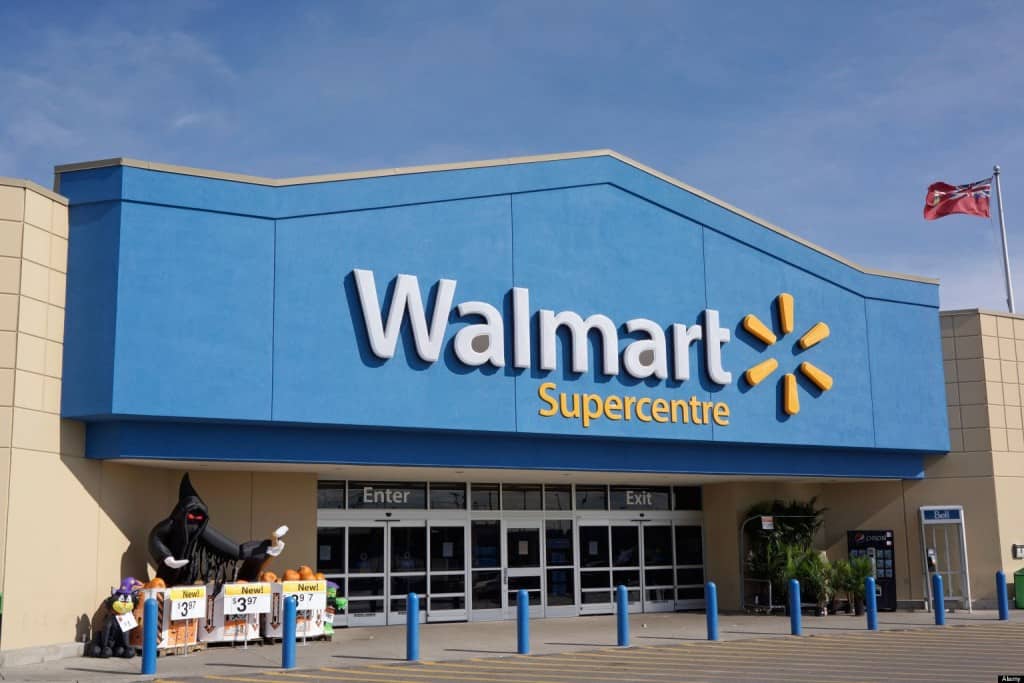Wal-Mart Stores, Inc. (NYSE:WMT) wants to do its part to protect the environment. In a push to be greener, the retail giant will extend its plastic bag fee to more stores in a handful of Canadian provinces. Wal-Mart will place a five-cent plastic bag fee on all single-use plastic bags.
Wal-Mart Stores, Inc. Handing Out Plastic Bag Fee
Jurisdictions all over Canada have been debating plastic bag fees programs. In the city of Toronto, a five-cent bag tax (plus a one-cent tax) was applied to all businesses and consumers. This was eventually reversed, but many stores voluntarily continued the practice to reduce plastic film from municipal land-fills.

One of these firms looking to reduce its effects on the planet is Wal-Mart.
Earlier this year, Wal-Mart introduced a five-cent plastic bag fee on all single-use plastic bags. It started in British Columbia on Feb. 9. As of this month, that fee will expand to Wal-Mart stores in Quebec, Ontario, Manitoba, Saskatchewan and Alberta. After that, Wal-Mart will extend the program to Atlantic Canada.
Simply put: each time a customer asks for a plastic bag, they will be charged a nickel (in Ontario, it would be six cents). Moving forward, it’ll also encourage shoppers to purchase a reusable bag for 25 cents.
“Walmart has improved its five-cent single-use bag to be 25 percent bigger and 25 percent thicker, reducing the need to double bag heavier items and lowering the total number of bags used,” the retailer said.
A portion of the sales will be allocated to plastic film recycling programs.
How well is the program doing? Since it launched in BC earlier this year, 19 million fewer bags were given to customers compared to the same time a year ago. This represents a 76 percent reduction of plastic, the company noted. This is the equivalent of 120 small cars.
Wal-Mart has 397 stores in Canada and serves more than 1.2 million customers per day. When the move was first announced in February, experts said it was just too late.
“There is no question they are late to the table with this. It’s been many years now that companies have been charging for bags or made the decision not to charge,” said Doug Stephens, the founder of Retail Prophet, in an interview with CBC News. “If Walmart does indeed want to contribute money back to reducing its environmental footprint and helping the environment then I suppose that’s a good thing.”
Will Wal-Mart Stores, Inc. Lead the Charge?
It’s estimated that up to one trillion plastic bags are used worldwide each year. One-third of these are consumed in the U.S. North American and European governments have either ignored the matter or have placed a ban/tax on plastic bags.
Many stores have voluntarily kept the five-cent fee on plastic bags. What they do with it remains unknown. But soon, stores in certain jurisdictions will be forced to apply a fee or not offer plastic bags at all.
In California, certain cities have plastic bag bans. If a specific bill is passed then all California cities would be plastic bag-free. A ban was recently passed in Portland, while several North Carolina towns have such a ban. Other cities in England, Mexico, Australia and India have bans.
Proponents of banning bags or implementing a tax say it will help the environment. Critics say it’s unnecessary because plastic bags are biodegradable and any tax will hurt the poor. Opponents add that reusable bags are harmful to your health because they carry a lot of bacteria, especially if you don’t wash it (apparently, many consumers do not wash their reusable cloth bags).
Whether you support plastic bags or not, there’s a strong move to ban them or tax them.
Trusted & Regulated Stock & CFD Brokers
What we like
- 0% Fees on Stocks
- 5000+ Stocks, ETFs and other Markets
- Accepts Paypal Deposits
Min Deposit
$200
Charge per Trade
Zero Commission on real stocks
64 traders signed up today
Visit Now67% of retail investor accounts lose money when trading CFDs with this provider. You should consider whether you can afford to take the high risk of losing your money.
Available Assets
- Total Number of Stocks & Shares5000+
- US Stocks
- German Stocks
- UK Stocks
- European
- ETF Stocks
- IPO
- Funds
- Bonds
- Options
- Futures
- CFDs
- Crypto
Charge per Trade
- FTSE 100 Zero Commission
- NASDAQ Zero Commission
- DAX Zero Commission
- Facebook Zero Commission
- Alphabet Zero Commission
- Tesla Zero Commission
- Apple Zero Commission
- Microsoft Zero Commission
Deposit Method
- Wire Transfer
- Credit Cards
- Bank Account
- Paypall
- Skrill
- Neteller
What we like
- Sign up today and get $5 free
- Fractals Available
- Paypal Available
Min Deposit
$0
Charge per Trade
$1 to $9 PCM
Visit Now
Investing in financial markets carries risk, you have the potential to lose your total investment.
Available Assets
- Total Number of Shares999
- US Stocks
- German Stocks
- UK Stocks
- European Stocks
- EFTs
- IPOs
- Funds
- Bonds
- Options
- Futures
- CFDs
- Crypto
Charge per Trade
- FTSE 100 $1 - $9 per month
- NASDAQ $1 - $9 per month
- DAX $1 - $9 per month
- Facebook $1 - $9 per month
- Alphabet $1 - $9 per month
- Telsa $1 - $9 per month
- Apple $1 - $9 per month
- Microsoft $1 - $9 per month
Deposit Method
- Wire Transfer
- Credit Cards
- Bank Account


